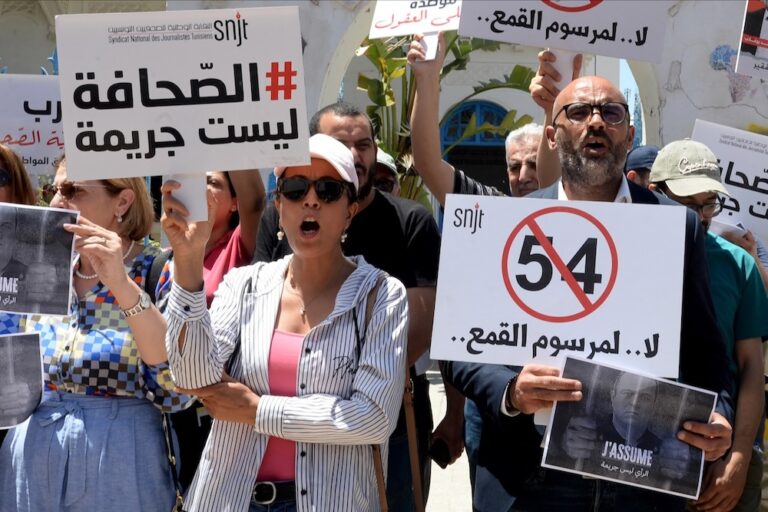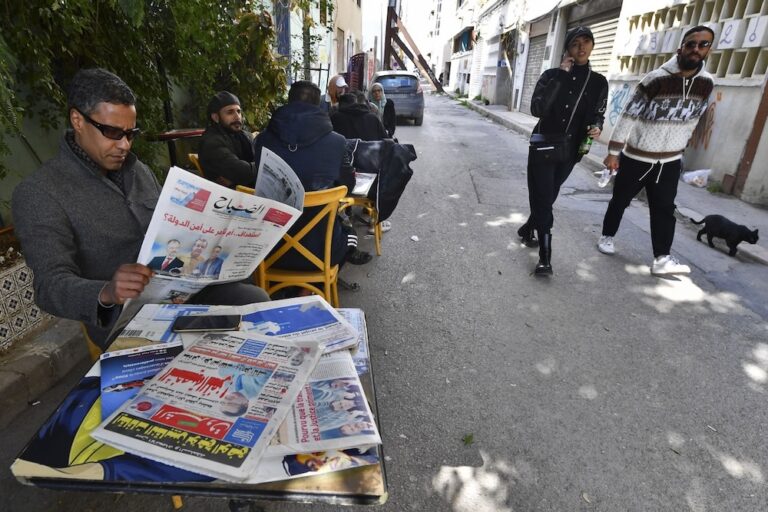(HRW/IFEX) – The following is a 26 May 1999 joint statement by the Committee to Protect Journalists (CPJ), Human Rights Watch, Reporters Sans Frontières (RSF), Amnesty International (AI), Lawyers Committee for Human Rights (LCHR), and the Observatory for the Protection of Human Rights Defenders, a program of the International Federation of Leagues of Human Rights […]
(HRW/IFEX) – The following is a 26 May 1999 joint statement by the Committee
to Protect Journalists (CPJ), Human Rights Watch, Reporters Sans Frontières
(RSF), Amnesty International (AI), Lawyers Committee for Human Rights
(LCHR), and the Observatory for the Protection of Human Rights Defenders, a
program of the International Federation of Leagues of Human Rights (FIDH)
and the World Organisation Against Torture (OMCT):
**Updates IFEX alerts of 25 May, 21 May, 20 May, 14 May, 28 April, 29
January and 13
January 1999**
TUNISIA: HUMAN RIGHTS DEFENDERS AT RISK
Human rights defenders and journalists in Tunisia are suffering from a
disturbing escalation of harassment and intimidation, the above eight
organizations warned today.
Last week, as the trial of Tunisian prominent human rights lawyer Radhia
Nasraoui approached, human rights lawyers and activists were put under
further pressure. The trial of Radhia Nasraoui and her 20 co-defendants,
accused of links with an unauthorized association and participation in
unauthorized meetings, has attracted wide attention both in Tunisia and
abroad. Some 20 foreign lawyers and several foreign diplomats attended the
trial on 15 May and some 120 Tunisian lawyers were present for the defence.
However, having deliberately failed to bring three of the defendants from
prison to the courtroom, the Tunisian authorities postponed the trial using
their absence as a pretext. The authorities have often employed such tactics
to postpone a trial in an attempt to inconvenience international observers
and prevent them from attending hearings.
On 24 May 1999, Taoufik Ben Brik, a journalist and member of the Conseil
national pour les libertés en Tunisie, CNLT (National Council for Liberties
in Tunisia), was arrested and detained for several hours for interrogation.
The previous week, on 20 May he was attacked outside his home in Tunis in
broad daylight by three individuals armed with chains. In the preceding
weeks, he had been prevented from leaving the country and had his passport
confiscated. His wife, Azza, had her car windows smashed as she was shopping
with their two young children. These incidents appear to be the result of a
number of articles he had recently published in France and Switzerland in
which he strongly criticized the deterioration in the human rights situation
and the increasing lack of public liberties and press freedom in Tunisia.
The CPJ joins the other organizations in expressing concerns for his safety.
Human rights lawyers and activists have recently come under further
pressure. Omar Mestiri, secretary-general of the CNLT, was arrested on 12
May 1999 at his home in Tunis. He was detained until the following evening
in the Ministry of the Interior and was questioned about his activities
within the CNLT, which was set up on 10 December 1998 but was refused
authorization by the Tunisian authorities last March.
The previous day the CNLT had issued an appeal condemning the arrest of 10
senior members of the Union générale tunisienne du travail, UGTT (General
Union of Tunisian Workers). These trade unionists were arrested and held for
two days in the Ministry of the Interior following a petition they and
others had issued condemning interference by the authorities in the affairs
of the UGTT. On 22 May Mohamed Tahar Chaieb, another leading trade unionist
and university lecturer, was arrested at Tunis airport upon returning from
Paris. He was detained for two days in the Ministry of the Interior and was
interrogated about his contacts with media, human rights organizations and
trade unions abroad.
In recent weeks the CNLT has issued several statements expressing concern at
the poor human rights situation and increasing restrictions on freedom of
expression and association in Tunisia. Several members of the CNLT, as well
as many other human rights defenders and lawyers have recently had their
telephone lines cut and have had their passports confiscated. Police
surveillance, a regular feature in the daily life of many human rights
defenders, has recently increased and a number of lawyers and human rights
defenders, including members of the CNLT, of the Association Tunisienne des
Femmes Démocrates, ATFD (Tunisian Association of Democratic Women), and of
the Ligue Tunisienne des Droits de l’Homme, LTDH (Tunisian Human Rights
League), report being constantly followed.
Dozens of other human rights defenders and their relatives have been
targeted by the authorities. LTDH vice-president Khemais Ksila, detained
since September 1997, continues to serve a three-year prison sentence for
issuing a communique criticizing the human rights situation in Tunisia. His
wife and children have been continually harassed and recently his
11-year-old son was prevented from leaving the country to go to Egypt to
receive a human rights award on behalf of his father. Human rights lawyer
Najet Yaqoubi, a member of the ATFD, is constantly followed by police and
her home and office are under surveillance.
Human rights lawyer Radhia Nasraoui has been prevented from leaving the
capital since March 1998 and was sentenced to 15 days imprisonment,
suspended, last February for leaving the capital to attend the funeral of
her mother-in-law. Her children have been intimidated by security forces on
several occasions. Human rights lawyer Najib Hosni is prevented from
working, his telephone has been disconnected and he is one of more than 25
lawyers who are refused a passport. Mohamed Bedoui, brother of former LTDH
President and current CNLT spokesperson Moncef Marzouki, was imprisoned last
March and is now serving a six-month prison sentence for refusing to be
comply with an order to report to police daily. Dr. Moncef Marzouki cannot
obtain a passport and his telephone
has also been disconnected.
AI, the CPJ, the FIDH, Human Rights Watch, the LCHR, the Observatory for the
Protection of Human Rights Defenders, the OMCT, and RSF are gravely
concerned by recent developments in Tunisia, notably the increasingly
frequent and serious incidents of intimidation and harassment of human
rights defenders and of those who seek to exercise their right to freedom of
expression and association. The organizations call on the Tunisian
authorities to:
– Put an immediate end to the harassment and intimidation of human rights
defenders, lawyers, journalists and trade unionists and lift current
restrictions imposed on them and ensure that their telephone and fax lines
be restored and they be allowed to enjoy their right to freedom of
expression, association and movement inside and outside the country;
– ensure that human rights defenders, lawyers, journalists and trade
unionists and their families be protected and be allowed to carry out their
human rights activities without interference, intimidation and persecution;
– release LTDH Vice-President Khemais Ksila immediately and unconditionally
and drop all charges against human rights lawyer Radhia Nasraoui and her
co-defendants;
– ensure that a prompt and full investigation be carried out into the attack
against Taoufik Ben Brik and that those responsible for the attack be
brought to justice.


